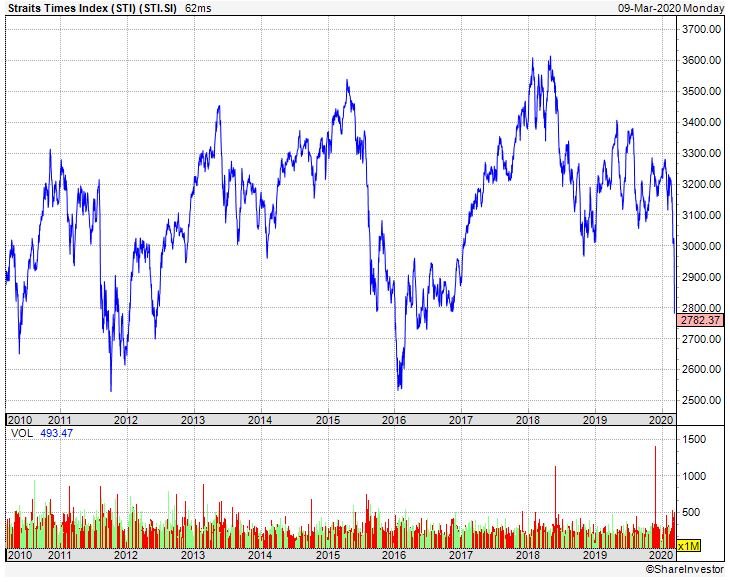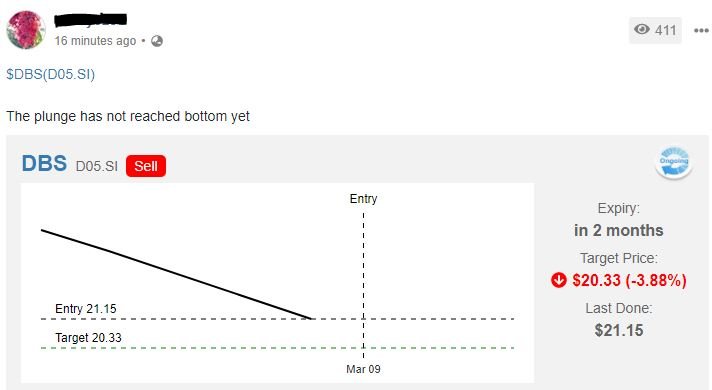Global markets are rattled with the double whammy of the corona virus fears + 20+% oil price plunge due to the Russia-OPEC agreement breakdown.
With that, the pre-U.S. markets were halted after a 5% limit down. Needless to say, the STI Index is down 6.03% on 9th March 2020!
To be honest, I have seen a 2 to 3% dip in STI Index during my years of investing but a 1-day 6% nosedive isn’t something I had experienced before.

Check out some posts i grabbed from the stocks’ social network – InvestingNote:
Banks dropping – Buy or Wait?
Oil Price Crash with Cryptos
DBS Share Price Estimation?
What You Can Do Amid The Market Correction
[thrive_lead_lock id=’5359‘]
With the flurry of activity, i think its sometimes very easy to lose your cool, lose yourself to want to ‘take action’.
As for me, i decided to pen down this post to calm myself and remind myself of the below steps.
1) Be Aware of the Markets Behaviour
The U.S. markets have dropped more than 10% and is considered a market correction now.
The good news? Not every correction morphs into a more feared bear market equivalent to a 20% or higher drop. The average bear since 1929 has sliced nearly 40% off the S&P 500.
In the 23 corrections since World War II the average price drop for the S&P 500 has been 14%, according to data from CFRA. They normally last around 4.4 months. Check out more here.
In a broader context, while a stock market correction is an inevitable part of stock ownership, corrections last for a shorter period of time than bull markets.
Based on research conducted on the Dow between 1945 and 2013, John Prestbo at MarketWatch determined that the average correction (which worked out to 13.3%) lasted a mere 71.6 trading days, or about 14 calendar weeks.
2) Do Nothing
Assuming you were fully invested in a diversified portfolio prior to the market drop, there is not much to do. Because you wouldn’t want to sell out your positions when the markets drop and then buy back later at a higher price.
That’s exactly Buying High, Selling Low!
In fact, most studies have shown that people who sold off during bear markets are not likely to ‘get back into the game’ even when stocks go into recovery.
Thus, sometimes he best course of action is to simply Do Nothing – and not pay attention to the financial media overreaction to a normal market correction.
3) Re-assessment of Portfolio
Sorry for the above picture but I feel that it is quite apt in this market correction situation.
The U.S. markets have been soaring to all time high without a significant breather in the past decade. Many stocks are also trading at mind-blowing prices – Tesla, Shopify, Virgin Galatica as investors discount their tremendous growth prospects to justify their sky-high valuations.
That being said, investing in the above stocks isn’t wrong. The point is to do a portfolio review and make sure that you are reassessing your holdings to ensure that the thesis of your purchase remains intact.
Ask yourself one simple question with each stock in your portfolio:
Is the reason I bought this stock still valid today?
If the answer is “yes,” then no action is required, other than perhaps adding to your position.
If your thesis is no longer intact, then it may be time to consider selling your position.
[/thrive_lead_lock]
Conclusion
Last but not least, people always ask this question:
How long will this last?
To be honest, I don’t have a crystal ball to predict the market selldown and when it will recover – nobody can do that anyway.
Hence, it could take a little while for markets to settle down or it can take years for the dust to clear. It’s hard to say.
But history has proven that the markets do go up in the long run (albeit not in a straight line) because of population growth and rise in corporate profits.
The only question is whether you are vested in these fundamentally strong companies poised to grow.





